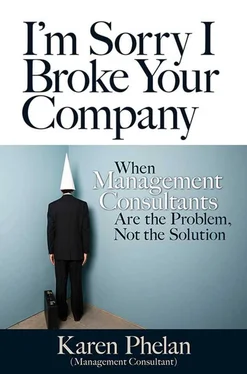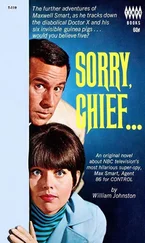Karen Phelan - I'm Sorry I broke Your Company
Здесь есть возможность читать онлайн «Karen Phelan - I'm Sorry I broke Your Company» весь текст электронной книги совершенно бесплатно (целиком полную версию без сокращений). В некоторых случаях можно слушать аудио, скачать через торрент в формате fb2 и присутствует краткое содержание. Город: San Francisco, Год выпуска: 2013, ISBN: 2013, Издательство: Berrett-Koehler Publishers, Жанр: management, popular_business, на английском языке. Описание произведения, (предисловие) а так же отзывы посетителей доступны на портале библиотеки ЛибКат.
- Название:I'm Sorry I broke Your Company
- Автор:
- Издательство:Berrett-Koehler Publishers
- Жанр:
- Год:2013
- Город:San Francisco
- ISBN:978-1-60994-740-8; 978-1-60994-741-5
- Рейтинг книги:3 / 5. Голосов: 1
-
Избранное:Добавить в избранное
- Отзывы:
-
Ваша оценка:
- 60
- 1
- 2
- 3
- 4
- 5
I'm Sorry I broke Your Company: краткое содержание, описание и аннотация
Предлагаем к чтению аннотацию, описание, краткое содержание или предисловие (зависит от того, что написал сам автор книги «I'm Sorry I broke Your Company»). Если вы не нашли необходимую информацию о книге — напишите в комментариях, мы постараемся отыскать её.
I'm Sorry I broke Your Company — читать онлайн бесплатно полную книгу (весь текст) целиком
Ниже представлен текст книги, разбитый по страницам. Система сохранения места последней прочитанной страницы, позволяет с удобством читать онлайн бесплатно книгу «I'm Sorry I broke Your Company», без необходимости каждый раз заново искать на чём Вы остановились. Поставьте закладку, и сможете в любой момент перейти на страницу, на которой закончили чтение.
Интервал:
Закладка:
When I was a consultant at Deloitte Haskins & Sells (DHS&S) in the late ’80s, Porters book was required reading. DHS&S was undergoing a major shift in It's management consulting arm. When I joined, each office had It's own local consulting practice and sold whatever work it was able to, usually small jobs to small local clients. After I had been in the New Jersey office about a year, the consulting leadership decided to develop a national consulting practice that would bring us more prestige, Fortune 500 clients, and bigger engagements with more revenues. It started with a strategic vision of organizing around industrial expertise, like banking and manufacturing, and developing service offerings. Local offices would be part of a national practice depending on the industries at their locations. New Jersey was a hotbed of pharmaceutical manufacturing, so we were part of the manufacturing practice. Because of our proximity to New York City, we also had a designated financial services practice. In addition to serving our local markets, we would also share resources nationally. This would provide a depth of experience often missing locally. At the time, this seemed like a good idea to me. Designated service offerings versus ad hoc services, national practice versus local, Fortune 500 clients versus smaller businesses — it seemed like a no-brainer. Who wouldn't want to be part of a strategic vision?
Part of this national practice vision required those of us in New Jersey to target some of the well-known pharmaceutical manufacturers. None of us had any pharmaceutical experience, so I, the most junior member, was tasked with doing a pharmaceutical industry analysis so that we could better position services to this very profitable industry. Using Porters book, I had the step-by-step instruction guide for doing an industry analysis. What I remember most about doing this was how difficult it was to obtain the necessary information. This was before the Internet, and digging up information required both calling companies posing as a shareholder and making numerous trips to the library to sift through syndicated databases. Given my difficulties, I wondered how thorough and comprehensive any competitor analysis could really be. You would really have to work at a given company to get all It's information. Despite having gaps in information, I managed to put together what looked like a comprehensive analysis of the industry with lots of graphs and charts and a summary of strengths, weaknesses, opportunities, and threats. I learned a great deal from this process and developed an in-depth knowledge of the pharmaceutical industry that I would use later in my career.
I wish I could say that my foray into developing a strategic analysis of the pharmaceutical industry was the beginning of a successful pharmaceutical practice, but shortly afterward, DH&S made the decision to merge with Touche Ross, and Touche took over the consulting practice, dissolving ours. Our strategy of becoming strategy consultants was foiled by external influences! If we had been any good, we would have seen that coming. At the time, I was astonished at this turn of events. Touche Ross was still using the local office, ad hoc model. We had a strategy ! We had centers of expertise! Yet Touche Ross had more work. While we had been focusing internally to pursue bigger clients, our actual sales had been dropping. Touche Ross was still bringing in a steady stream of client engagements using the old model. As a result, most of the DH&S consultants were let go because we had no ongoing client accounts or important relationships to bring to the merged practice. While we had developed some expertise, some service offerings, and an organization structure, we hadn’t developed the client base to go with them. In hindsight, I was spending a lot of time in the office doing analyses and not much time on billable client work.
Touche Ross had a much broader practice. It had numerous services I had never heard of in nonprofits, hospitals, and Medicare, Medicaid, and other government organizations, like conducting patient surveys and ferreting out fraudulent claims. While Deloitte was consolidating around financial services and manufacturing service offerings, Touche was just seizing whatever opportunities presented themselves.
To be fair, all the accounting firms did eventually develop more organized practices with service offerings, but these practices eventually emerged from the work they were doing. DH&S tried to use a top-down model dictated by a handful of managing partners based on their own experiences. Although it sounded good in theory, we missed a lot of opportunities, especially with the assumption that manufacturing would continue to be the bulk of the US economy. I learned that pursuing a strategy can actually have a downside, that of lost opportunities. Rather than responding to the marketplace by taking whatever client work presented itself, we tried to dictate the marketplace. With our single-minded focus, we ignored new markets and new services and focused on a vision we couldn’t bring to fruition. I wish I could say that this was an isolated experience, but I would live through something similar two more times, with Gemini Consulting and Pfizer.
In 1990,1 joined the United Research Company, an operations and organization improvement consulting group, while it was undergoing a merger with the MAC Group, a strategy house, to become Gemini Consulting. For a few short years, Gemini became the go-to consultants to drastically reduce the number of permanent employees and increase efficiencies under the banner «business process reengineering.» Unlike other consulting companies of that time, we actually implemented the recommended changes and promised specific results in the form of cost savings. Every consulting engagement had a benefits case that detailed the savings we promised to deliver. During the economic downturn of this period, Gemini became very successful at helping companies downsize, and we grew rapidly. Our engagements also became larger and larger, and in some cases we «transformed» entire divisions and even entire companies at one time.
Another entity famous for downsizing was General Electric. Under CEO Jack Welch, GE grew to become the largest company in the world through approximately one thousand acquisitions. However, he divested and laid off as much as he acquired, firing over one hundred thousand workers, almost 25 percent of the company, leaving empty buildings in his wake and earning him the name Neutron Jack. His philosophy was that a business should be number one or two in It's industry in terms of market share or else be sold off. This was not an isolated or radical viewpoint. The Boston Consulting Group, one of the oldest and most prestigious strategy consulting companies, had long advocated for investing in business units that have a high market share and growth potential (stars) and divesting the «dogs» that don’t. Because of GE's success, Welch's philosophy and methods were widely copied by other companies and deemed best practices.
One of his other much-admired and imitated philosophies was the concept of creating shareholder value, whereby a company ensures that shareholders get a better return from It's stock than they could from other investments. A mathematical formula shows that shareholder value is a function of a company's return on It's assets (ROA) and It's investments (ROI). Together this is the return on equity, or ROE. This philosophy created a fixation on a bunch of financial measures — for example, ROE, ROA, ROI, and ROCE (return on capital employed). Managing these metrics would result in positive cash flows that would be reflected in the stock price, thus earning the shareholders better returns. (Of course, this is predicated on the efficient market hypothesis, which assumes rational entities buy stocks based on these types of calculations. This all falls apart if people purchase the stock because the logo looks pretty.) Hence, in addition to the traditional measures of revenues and profits, executives in the late '80s and early '90s became fixated on market share, share price, and a variety of financial metrics to determine how productive the company's assets and investments were. Management by the numbers and a focus on asset efficiency were in full swing.
Читать дальшеИнтервал:
Закладка:
Похожие книги на «I'm Sorry I broke Your Company»
Представляем Вашему вниманию похожие книги на «I'm Sorry I broke Your Company» списком для выбора. Мы отобрали схожую по названию и смыслу литературу в надежде предоставить читателям больше вариантов отыскать новые, интересные, ещё непрочитанные произведения.
Обсуждение, отзывы о книге «I'm Sorry I broke Your Company» и просто собственные мнения читателей. Оставьте ваши комментарии, напишите, что Вы думаете о произведении, его смысле или главных героях. Укажите что конкретно понравилось, а что нет, и почему Вы так считаете.












